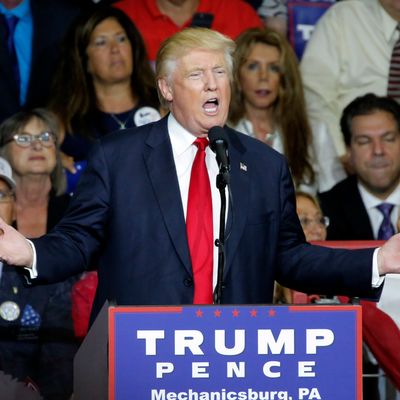
During rallies in two battleground states on Monday, Donald Trump called Hillary Clinton “the devil” and did not mention his feud with the parents of a U.S. soldier killed in Iraq, raising Republicans’ hopes that he was finally moving past the story.
However, their relief was short-lived. In an interview with a local Ohio TV station released Monday night, Trump called U.S. Army Captain Humayun Khan “a hero,” but added that he thinks his father, Khizr Khan, spoke out against him at the Democratic National Convention because he’s worried that if elected, Trump will rid the nation of Islamic terrorists. “It’s a very big subject for me. And border security’s very big,” Trump said. “And when you have radical Islamic terrorists probably all over the place, we’re allowing them to come in by the thousands and thousands. And I think that’s what bothered Mr. Khan more than anything else.”
Later on Fox News, Sean Hannity suggested Khan’s attack was unfair to Trump. The candidate shrugged off the criticism, but asserted, “His son died 12 years ago. If I were president, his son wouldn’t have died, because I wouldn’t have been in the war, if I was president back then.”
Meanwhile at a rally in Nevada, a pro-Trump crowd booed a military mom who cited his attacks on the Khans. “You’ve got a son in the military, how do you tolerate this disrespect?” she asked Trump’s running mate, Mike Pence.
Pence calmed the crowd by declaring, “That’s what freedom looks like, and that’s what freedom sounds like.” He went on to insist that there is “no one more devoted to the veterans in this country” — despite the fact that Trump spent the past few days criticizing a dead war hero’s parents.
Like Pence, many Republicans have responded to the Khan feud by claiming Trump didn’t mean what he said, or that his views don’t represent the party that nominated him. As the Washington Post’s Janell Ross notes, it’s become a familiar pattern:
First, Trump says something — sometimes by his own initiative, sometimes in what he considers necessary pushback — that heretofore has been considered out of bounds, an endorsement of some form of bigotry or an idea that is anti-democratic. Then, after a great and collective clutching of pearls, Trump and his surrogates defend those comments, sometimes expand on them.
Finally, Republican party officials and elected office-holders indicate that while the comments were out of bounds and not representative of the party, they will, however, support Trump, the party’s presidential nominee.
Earlier today New York’s Jonathan Chait argued that Trump forced the GOP to choose between defeat or tolerating racism, and they chose racism. While some have embraced Trump and a smaller number have revolted against him, most Republicans are somewhere in the middle, trying “to avoid the taint of Trump’s racist ideas while maintaining the support of the voters who are attracted to them.”
Maintaining that contradictory position may be even harder this time around, since Trump isn’t feuding with government employees, like Senator John McCain or Judge Gonzalo Curiel. “Nobody minds when he attacks other politicians; in fact, they like it. He’s instilling an accountability that doesn’t exist. But they don’t like it when he goes after real people, and they wish he would stop,” GOP pollster Frank Luntz, who conducted a focus group about Trump on Friday in Ohio, told the Post.
The incident’s effect on voters remains to be seen, but The Wall Street Journal’s Bret Stephens has responded with a searing rebuke to all the “go-along Republicans” who criticize Trump while refusing to retract their endorsement. In his latest column, Stephens says Trump has shown he’s “morally unfit for any office, high or low” and Republicans — he singles out Paul Ryan — aren’t going to save themselves or their party by dodging questions about Trump’s character:
It will not do for Republicans to say they denounce Mr. Trump’s personal slanders; his nativism and protectionism and isolationism; his mendacity and meanness and crassness; his disdain for constitutional protections — and still campaign for his election. There is no redemption in saying you went along with it, but only halfway; that with Mr. Trump you maintained technical virginity. To lie down with him is to wake up with him. It’s as simple as that.
Stephens says the Khan incident should be the final straw; Hillary Clinton will probably be sworn in as president in January, and if they want to maintain “a claim to moral and political respectability” Republican lawmakers should reject Trump now. He even offers a Clinton endorsement of sorts:
Mrs. Clinton is not the apotheosis of evil. She may be a corner-cutter and a liar, and she’ll almost surely appoint liberals to the Supreme Court. But at least she’s not a sociopath.
As of this writing, no Republican officials have announced that they’re embracing Clinton thanks to Stephens’s Never Trump rallying cry. In fact, it looks like when it comes to Trump, they’re totally committed to passive-aggressive resistance. When the Trump campaign asked Republicans in Congress to issue statements backing him up in his fight against Khan, they responded by leaking the memo to the press.






























